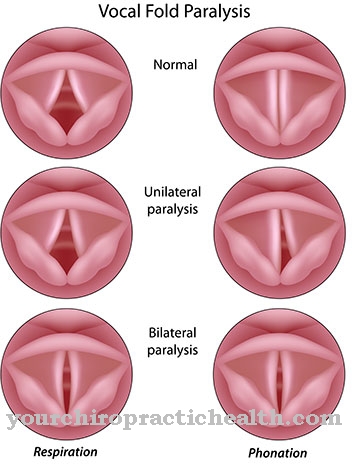The Muckle Wells Syndrome is a hereditary metabolic disease that belongs to the amyloidosis group and causes an inflammatory reaction in the body. Characteristic symptoms are fever, hives and later hearing problems. The treatment is medicated and is primarily directed against the chain reaction that causes the symptoms of inflammation.
What is Muckle-Wells Syndrome?

© olando - stock.adobe.com
At the Muckle Wells Syndrome is an autoinflammatory disease which the World Health Organization classifies as non-neuropathic heredofamily amyloidosis (E85.0). The medicine calls amyloidosis deposits of proteins that accumulate in the spaces between the cells.
In an autoinflammatory disease like Muckle-Wells Syndrome, the body sets in motion processes that are actually intended as a response to inflammation. The various symptoms, such as fever, serve to fight bacteria and other foreign bodies more effectively. In Muckle-Wells syndrome, however, this reaction occurs without any actual inflammation being present.
Autoinflammatory diseases are similar to autoimmune diseases in which the body's defense reaction is directed against the immune system and not against a sham inflammation.
causes
Muckle-Wells syndrome is a hereditary disease. It is passed on to children from at least one parent via the NLRP3 gene on the first chromosome. Other autoinflammatory diseases can also be based on a change in NLRP3. The modified gene is dominant and therefore leads to the outbreak of the disease even if it only occurs once in the genetic code. However, not every child of an affected person has to fall ill as well.
Humans have a diploid set of chromosomes: each chromosome is normally present twice. If only one parent suffers from Muckle-Wells syndrome and has a second healthy chromosome in addition to the disease-bearing chromosome 1, the probability of inheritance is around 50 percent. The NLRP3 gene encodes a specific protein, the so-called cryopyrin.
Cryopyrin participates in the transmission of inflammation signals and the programmed suicide of cells (apoptosis). In addition, it stimulates the synthesis of interleukin-1β - a messenger substance that promotes inflammation. Interleukin-1β, in turn, stimulates the liver cells to produce serum amyloid A protein (SAA).
Medicine today knows three different types of acute phase SAAs, which the body produces in response to inflammatory signals: SAA-1 and SAA-2 play a role primarily in the inflammatory reaction of the liver, while SAA-3 also play a role in other tissues occurs.
Symptoms, ailments & signs
The symptoms of Muckle-Wells syndrome vary greatly from person to person. However, the recurring, interrupted episodes of the disease are characteristic. During the episodes, symptoms that are indicative of immune and inflammatory reactions become more pronounced. Typically, sufferers have a fever during these phases or at least have an elevated temperature.
The fever often occurs with muscle pain and joint discomfort. Hives are also very common in Muckle-Wells syndrome. Medicine also calls this skin reaction urticaria. It leads to wheals, which show up as small bumps in the skin as the tissue underneath them swells. Often the skin is also reddened.
In the later course of the disease, those affected can lose their hearing. As a rule, hearing ability initially only decreases slightly and then decreases continuously.The progressive amyloidosis damages the organ of Corti between the snail and eardrum and / or the vestibulocochlear nerve. As a result, the cochlea in the inner ear becomes less functional.
Medicine also calls the vestibulocochlear nerve the auditory balance nerve - it is also responsible for the sense of balance. Dizziness and nausea are therefore also symptoms of Muckle-Wells syndrome. Tiredness, concentration problems and brief loss of consciousness occur less frequently.
The progressive damage to the kidneys causes a number of other symptoms: there is an unnaturally high amount of protein in the urine (proteinuria) and those affected have a significantly increased risk of acute kidney failure.
Diagnosis & course of disease
Muckle-Wells syndrome appears to be very rare, although exact data are not available. In many cases, it only becomes noticeable in adolescence. As the disease progresses, the symptoms increase in number and severity. Doctors often make the diagnosis after taking a detailed medical history and after ruling out other causes of the symptoms.
In the laboratory test, the increased sedimentation rate and a high content of C-reactive protein in the blood provide further information. A genetic test can provide final clarity as to whether the person concerned carries the altered NLRP3 gene, which causes Muckle-Wells syndrome. However, the genetic test is not absolutely necessary for diagnosis.
Complications
Muckle-Wells syndrome primarily causes severe reddening of the skin. The affected areas on the body can also swell and be affected by unpleasant itching. It is not uncommon for those affected to feel ashamed and also suffer from inferiority complexes or from a reduced self-esteem. Psychological complaints or depression can also occur.
Muckle-Wells syndrome can also lead to pain in the muscles and joints. Particularly at night, this pain can lead to sleep problems and thus to irritation in the patient. Those affected usually continue to suffer from a fever and a weakened immune system. As a result, infections or inflammations occur more often, so that the patient's quality of life is significantly reduced.
Concentration also decreases and those affected appear exhausted and tired. Muckle-Wells syndrome significantly increases the risk of kidney failure. Complications usually arise when Muckle-Wells syndrome is not treated. The internal organs fail and the person concerned dies.
The treatment itself can take place with the help of medication and significantly reduce the symptoms. It cannot be universally predicted whether Muckle-Wells syndrome will lead to a reduction in life expectancy.
When should you go to the doctor?
If the first signs of Muckle-Wells syndrome are noticed, a doctor should be consulted immediately. Muscle pain, joint discomfort and reddening of the skin indicate a serious illness, which must always be clarified by a doctor and then treated. The doctor can determine whether the symptoms are actually caused by Muckle-Wells syndrome and, in cooperation with various specialists for internal diseases, initiate appropriate treatment. If this happens early, serious health complications can usually be ruled out.
However, if wheals or even hearing impairment or balance appear, the metabolic disease may already be well advanced. At this point at the latest, a specialist must be consulted who can clarify the symptoms and, if necessary, initiate treatment. In the case of acute kidney failure, the emergency doctor must be called. Further therapy takes place in a specialist clinic for metabolic diseases. Those affected can first see their family doctor or a specialist in internal diseases. Children should be presented to the pediatrician if they suspect Muckle-Wells syndrome.
Therapy & Treatment
Previous therapies cannot completely cure Muckle-Wells syndrome, as the causative mutation persists for life; however, the symptoms are mostly treatable. Doctors usually use drugs to stop the inflammatory response. One of them is anakinra. It is an interleukin-1 receptor antagonist.
Anakinra can improve hearing at the symptomatic level and normalizes the erythrocyte sedimentation rate and C-reactive protein. Those affected usually inject it under the skin at about the same time each day. Anakinra reduces the effects of both interleukin-1α and interleukin-1β. Another drug called canakinumab specifically focuses on interleukin-1β, which mediates the autoinflammatory response in Muckle-Wells syndrome.
Canakinumab lingers in the body for some time; Patients receive the injections several weeks apart. Medicine often uses cortisone to relieve the symptoms of inflammation. In addition, those affected often take pain relievers. If left untreated, Muckle-Wells syndrome leads to progressive disabilities and organ failure.
You can find your medication here
➔ Medicines to strengthen the defense and immune systemOutlook & forecast
Muckle-Well syndrome has a relatively poor prognosis. The treatment of the genetic disease is purely symptomatic. Early treatment can reduce pain and inflammation. The physical malformations can be treated with an early diagnosis, but not completely corrected. Affected people always suffer from physical limitations. The poor general physical and mental condition often results in emotional complaints. The quality of life is generally greatly reduced and well-being continues to decline as the disease progresses.
Prescribed medication such as cortisone or rilonacept are associated with side effects that additionally limit well-being. The same applies to any interventions on the joints that are risky due to the risk of inflammation. Untreated Muckle-Wells syndrome is progressive. The disabilities and malformations increase and cause concomitant diseases. Life expectancy is reduced by infections, amyloidoses and other ailments.
The prognosis of Muckle-Well syndrome is based on other factors such as the type of therapy and any concomitant diseases. The specialist in charge usually gives the patient and their relatives a precise prognosis, which can be used to precisely plan further measures.
prevention
Since Muckle-Wells syndrome is a genetic disease, prevention is currently not possible. In the future, genetic engineering treatments could eliminate the fault in the NLRP3 gene in order to prevent the syndrome from being inherited.
Aftercare
In most cases, those affected with Muckle-Wells syndrome have no special or direct follow-up measures available. Ideally, you should see a doctor at the first signs and symptoms so that there are no other complications or further worsening of the symptoms. Muckle-Wells syndrome cannot heal itself, so those affected should consult a doctor at an early stage.
Since this is a genetic disease, a genetic examination and advice is advisable if you want to have children. Most of those affected are dependent on taking various medications. The correct dosage and regular intake of the medication should always be observed. If you have any questions or are unclear, you should always consult a doctor first.
Regular checkups by a doctor are also very important in Muckle-Wells syndrome, as the internal organs in particular can be negatively affected by the syndrome. Hearing aids should be used if you have hearing problems. Especially with children, parents must ensure that hearing aids are worn correctly and that they take medication correctly. In many cases, this syndrome significantly limits the life expectancy of those affected.
You can do that yourself
Muckle Wells Syndrome must first be treated by a doctor. Since the hereditary disease has a very negative effect on general well-being, the most important self-help measure is to counteract the individual symptoms through rest, protection and individual measures.
You can do this, for example, by changing your diet. In consultation with the doctor and a nutritionist, a suitable diet can be created. We recommend foods with many vitamins and minerals, for example nuts, fruits and vegetables, as these help with fever, hives and other typical complaints. If the kidneys are involved, alcohol, caffeine and other drinks that put additional strain on the organ should be avoided. Food that is excessively salty or spicy should also no longer be consumed, as they put a considerable strain on the kidneys. If the doctor makes special dietary requirements, the patient should use them as a guide.
After the acute phase, the immune system can be boosted through moderate exercise. There are walks as well as exercises from yoga or aerobics. Which measures make sense in detail always depends on the individual symptoms of the autoinflammatory disease and must be worked out together with the family doctor.






.jpg)




















